Community first, football second
Community first, football second
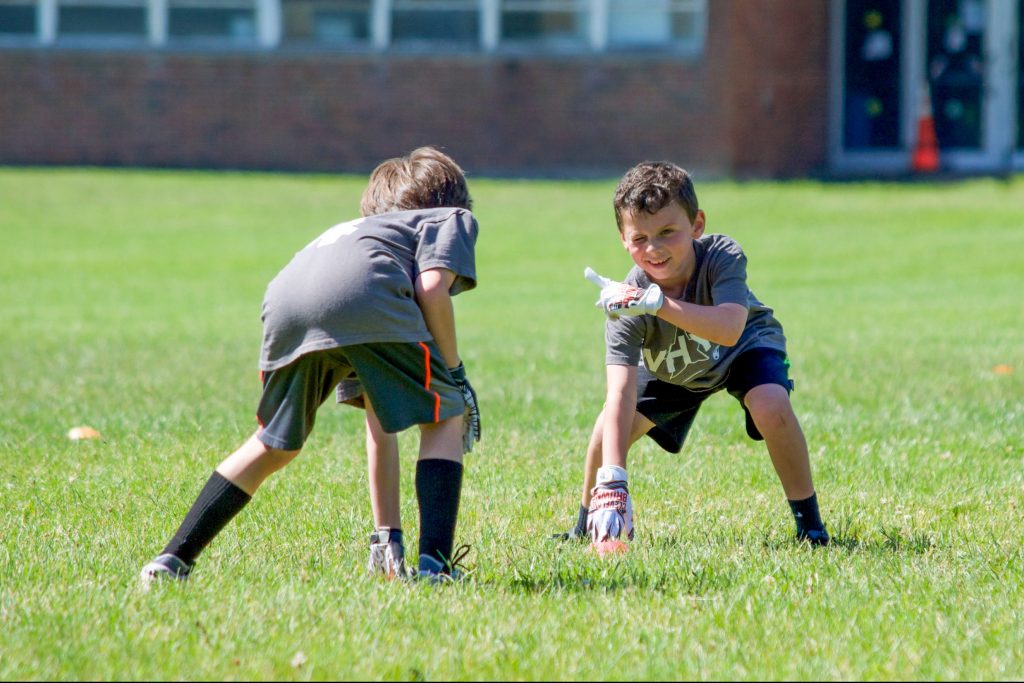
The unassuming field sits in Liverpool, just outside the Syracuse city limits, flat and open and nestled among suburbia. Browned vines weave between the diamond-shaped holes in a tall, chain link fence used for batting practice, signaling signs of vacancy. But the field isn’t being used for baseball, and it’s not empty.
Dozens of kids form lines in the middle of the field between orange and blue practice cones. Each child dons a different t-shirt color, informally breaking them into teams, and red nylon flags drape from a belt around their stomach. The player in the front of each line holds a football larger than their head.
In the middle of the field stands the leader of the group. Under a bright and warming sun, eyes shaded by the brim of a tan bucket hat, stands Will Hunter, all 5-feet-10-inches of the 42-year-old coach.
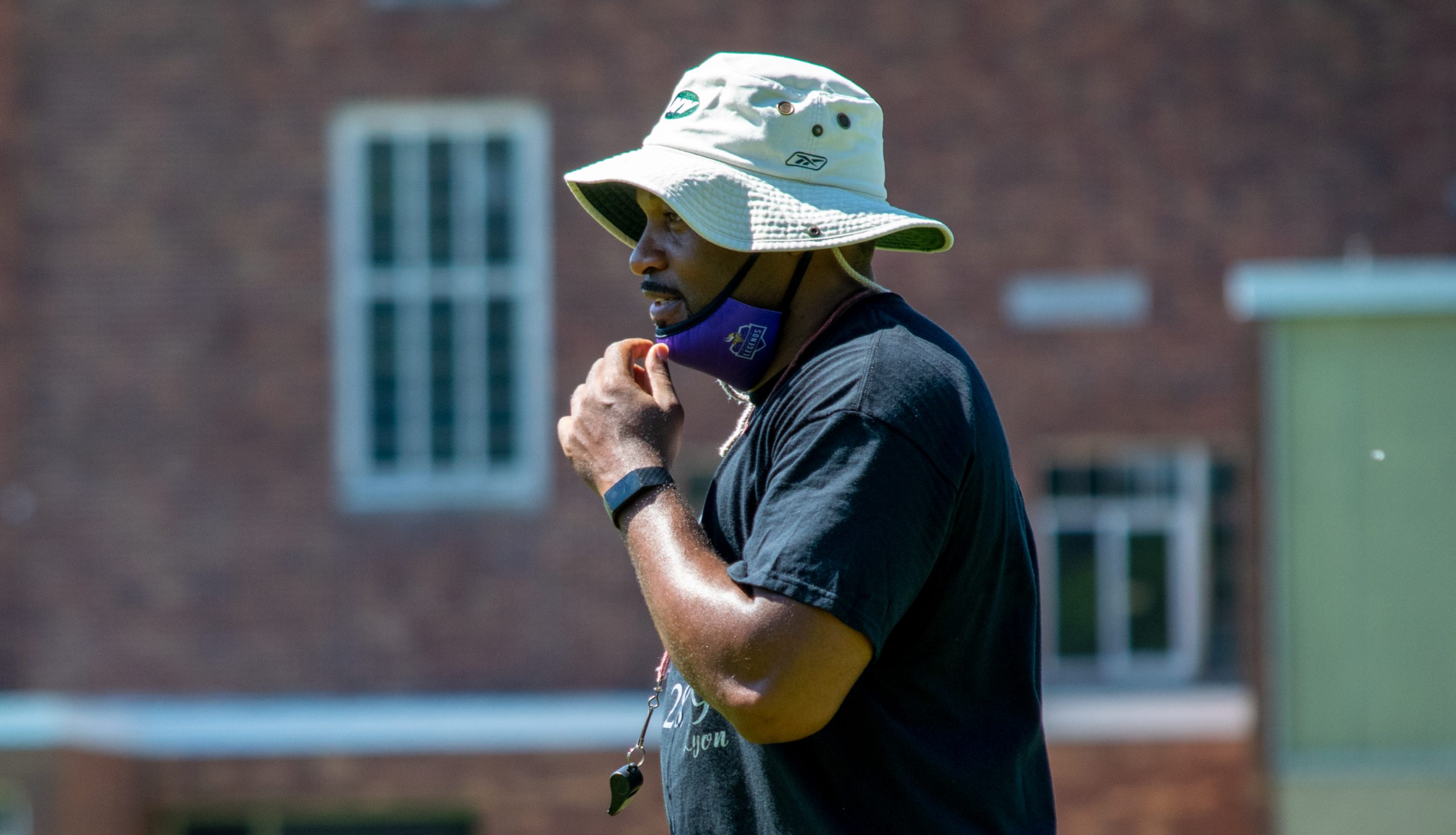
This Sunday morning is Father’s Day, but it’s also the second-to-last week of the first summer program. Hunter’s dad-themed shirt — displaying the birthdays of his three children under the headline “Dad Established” — and black gym shorts give no indication that he devoted much of his life to football.
Hunter was a four-year letter winner and team captain with Syracuse football. When his college career ended, he bounced around the NFL, landing as a safety with the Minnesota Vikings for a season. Soon enough, Hunter’s time in football came to a close. But he wasn’t ready to give up the game quite yet.
That’s how his youth sports training program, Will Hone Your Skills, started. For Hunter, it served as a natural next step.
“I actually went to school to be a teacher because they were the people that took an interest in my life and helped shape my actions and behaviors, my character, so to speak,” Hunter said. “The one thing that I always wanted to do was give back and, for me, the way to give back was through youth sports.”
Then the desire to be his own boss pushed Hunter into something bigger. Now, he’s not only the director of a program introducing kids to the sports he grew up playing, but he’s become the ringleader of a large, adopted family. This particular afternoon shows that, with Hunter spending his Father’s Day not only with his kids but with dozens of other families who have committed to his program for over five years.
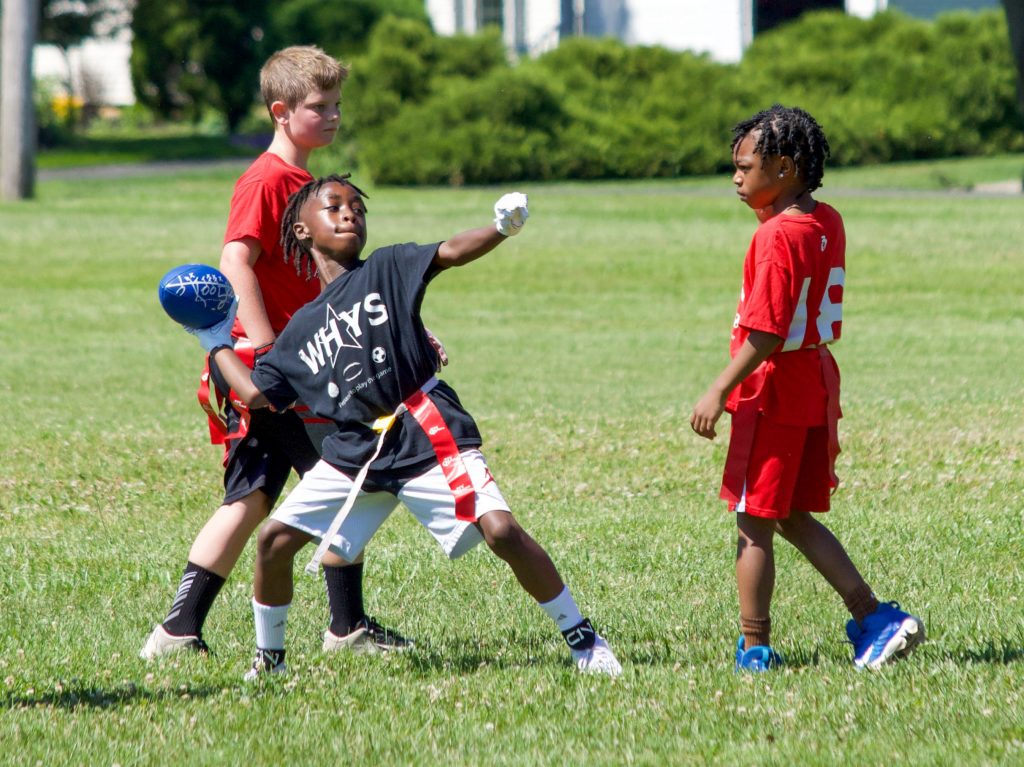
One of the kids in WHYS throws a pass toward the end zone during the game section of Sunday practice.
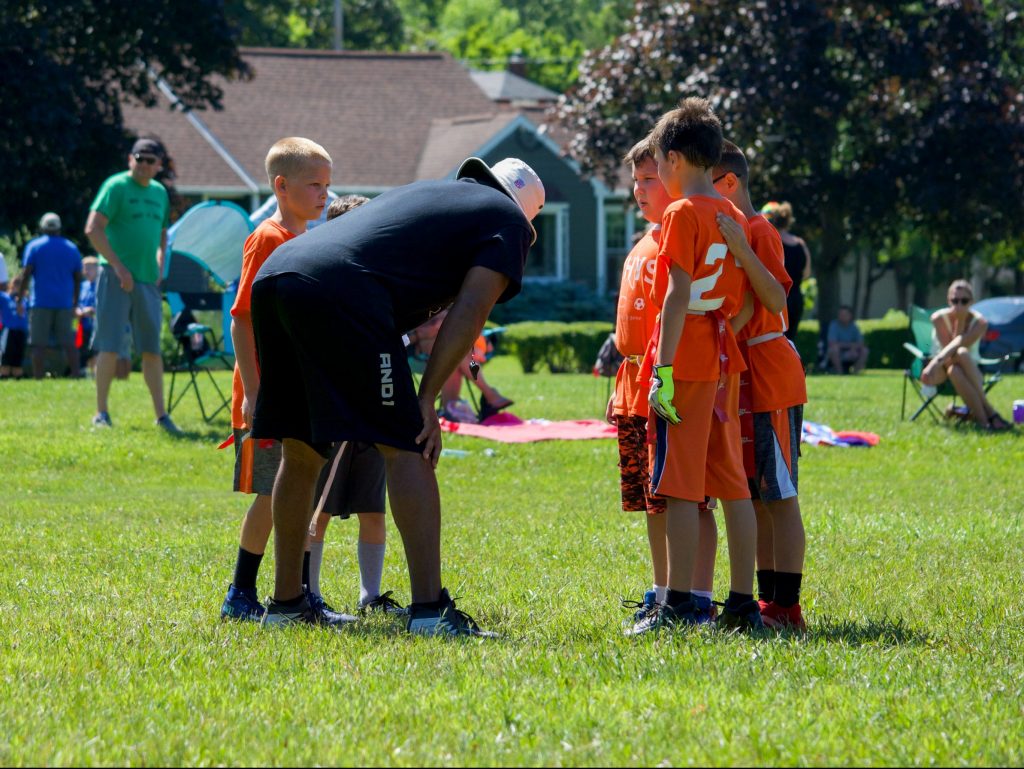
Hunter huddles with one of the teams before their game begins to discuss strategy.
It’s difficult not to notice the family-focused program Hunter has cultivated. Each Sunday, he hosts three different sessions, starting with the youngest players’ introductory skills session to the pre-teens nearly ready to “graduate” from the program. As the kids take the field and follow Hunter and his assistants’ every instruction, a wall of parents and siblings take up camp with lawn chairs, coolers and the occasional canopy (even with the summer sun beating down as early as nine in the morning).
Parents wait with water at the ready as kids run on and off the field to quench their thirst. When the 30-minute skill session ends, and the games start, there isn’t a relative around without a vested interest in what’s happening. Parents cheer for their children, but they also encourage their teammates’ success. Sometimes, they shout encouragement for the players on the opposite field, the ones who have nothing to do with their children’s game.
Tricia Leone is one of those parents. She lines up on the edge of the field with a couple other sets of parents; their sons have grown up together in Hunter’s program. She hands a phone to her daughter as she talks, and her eyes rarely leave the field. After four or so years trusting her kid’s athletic success to Hunter, she expresses that there are few other people she would want to coach her son.
“Just for our kid’s sake, that they know he played in the NFL, I mean, that’s every kid’s childhood dream,” Leone said. “For him to bring that back to his community, I think it shows what an amazing person Will is. He’s so thoughtful with our kids and you know he truly wants to see them develop as individuals. As much as he’s training them to be athletes, he just wants to see them succeed in life.”
And that theme extends through all arms of the program. The families come for football, but they stay for Hunter. Johnathan Turveville started Hunter’s program when he was around 7 years old; three years later, there isn’t a football program Turveville misses. His dream is to play football professionally, and what better man to teach him how to get there than Hunter.
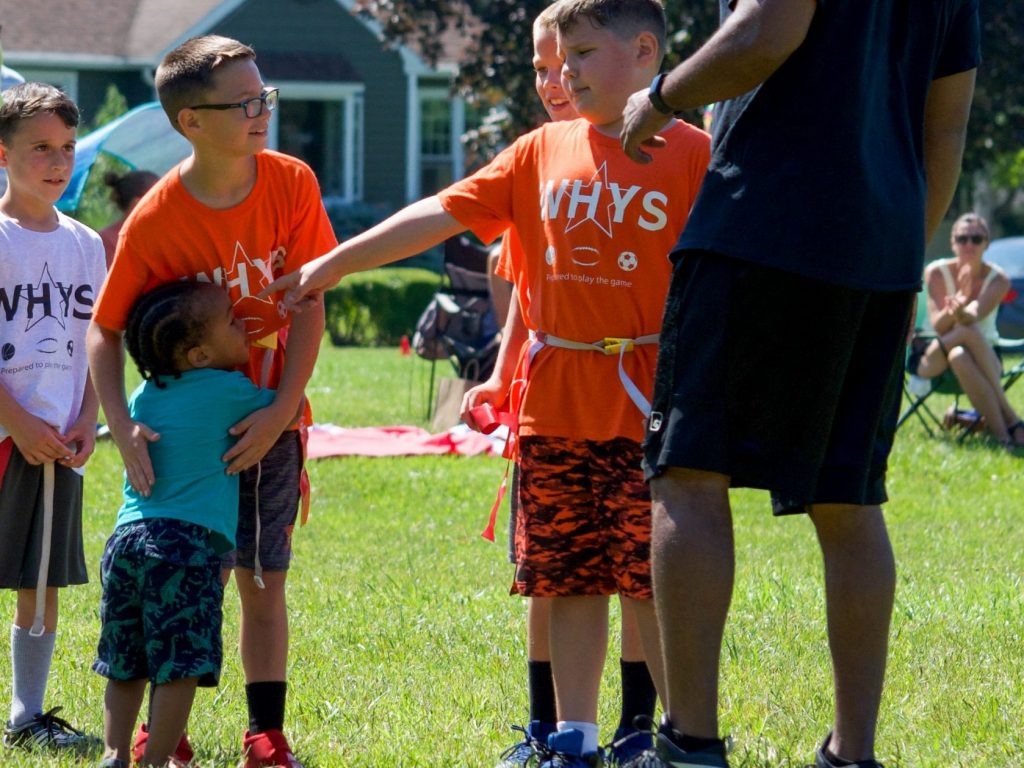
Hunter’s youngest son offers hugs to some of the players during practice on Father’s Day.
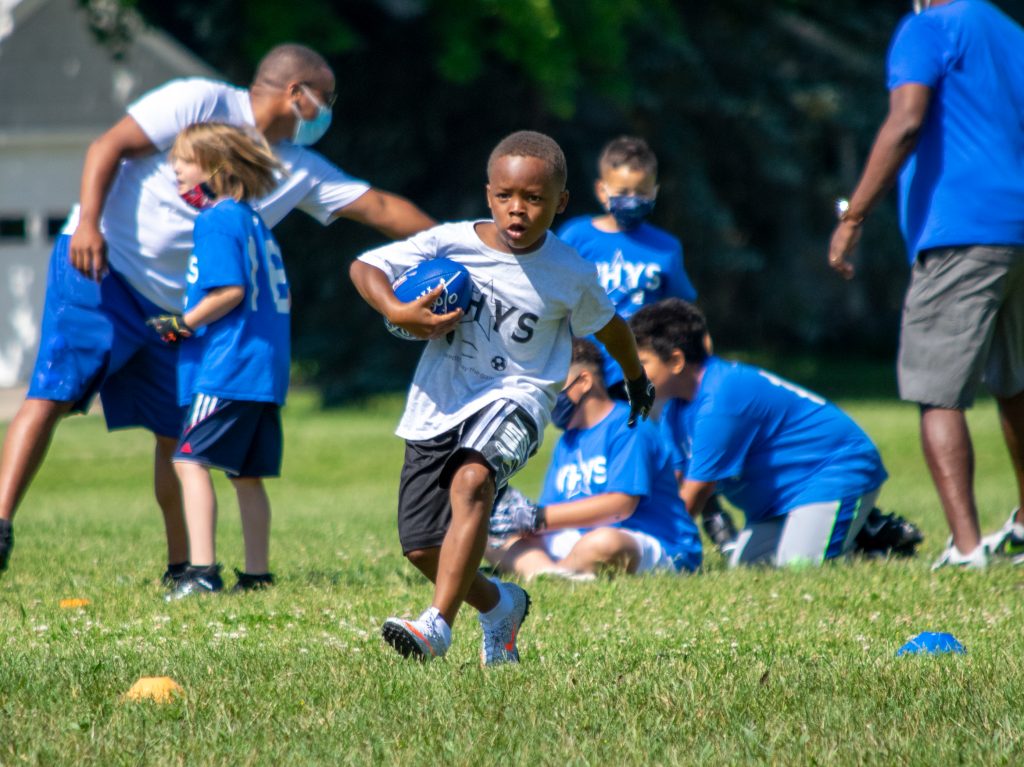
A child runs with the ball during the skills section of practice. Hunter’s one-hour sessions are split: half for skills training and half for playing.
Most of Hunter’s lineup of assistant coaches, who help ensure that every child gets personalized attention during the limited one-hour sessions, joined him because their own child went through WHYS. His assistant coach Kelby Valenti knows there is a reason people keep coming back to them year in and year out.
“It’s a really good program, just having kids come out and have fun and it’s no pressure. But there’s lots of fun and learning a little bit more than football,” Valenti said. “Everybody gets a chance; everybody gets a turn. Everybody just gets that opportunity to do something whether they can play football, whether they can’t play. They’re still learning and getting better every single week.”
Valenti emphasized that, while WHYS is rooted in sports, football is only a small part of their mission. He said it’s more about learning how to be part of a team and learning how to be your best self every week.
“Those things are the most important things, because they’re going to take you a lot farther than what sports is going to do,” Hunter said, echoing Valenti’s statement. “We want to build their confidence to understand that there’s going to be some challenges in life, and they know how to deal with them. It’s what determines how successful they’re going to be.”
In the 30-minute game that follows skill training, every kid gets a chance to play quarterback and most get a chance to make a catch or run the ball. No one keeps score. Winning isn’t the focal point of this program; it never has been.
Hunter knows what it’s like to have a hobby turn into a job. He also knows what it’s like to watch that dream slip away. An achilles injury during a game of pick-up basketball cost him his football career, and despite chuckling about it now, it’s never easy to watch a dream die. So, he focuses on keeping football fun. Whether that’s cheering on kids to get back on the field faster after a water (or cry) break or picking up the ball-carrier to get them closer to the endzone, Hunter only wants to inspire the next generation of football players to love the game.
“Kids might not always be the fastest, strongest, biggest – that type of thing,” Hunter said. “But we want them to feel like they’re a part of something. We give them the opportunity to come out and be great. But when they leave, they’re going to feel like it’s much bigger than just the game of football.”






